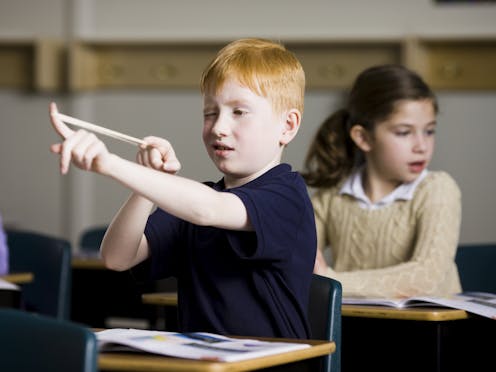Disruptive kindergartners are likely to be bullied later in elementary school
- Written by Paul L. Morgan, Eberly Fellow, Professor of Education and Demography, and Director of the Center for Educational Disparities Research, Penn State

Kindergartners who act out, disrupt classrooms, get angry and argue with their teachers are especially likely to be bullied[1] once they reach third, fourth and fifth grade, our research group has found.
We continue to investigate bullying in U.S. elementary schools, but our initial findings indicate that the odds that disruptive kindergartners will be shoved, pushed or hit, teased or called names, left out, and have lies told about them are roughly twice as high as for kindergartners who do not act out in classrooms. We observed this in analyses accounting for many other risk factors.
Our findings are consistent with, but also extend, prior research documenting that children who are from poor families[2] or who are struggling academically[3] are more likely to be bullied than their peers who are from wealthier families[4] or who are more academically skilled.
As with older children[5], we find that young boys are more likely to be shoved, pushed or hit, while young girls are more likely to be teased or called names, left out, and told lies about. Children with disabilities, particularly boys, are more likely to be frequently bullied. Black boys more frequently experienced other children telling lies about them than white boys, consistent with prior work finding that Black children are at greater risk of being bullied in adolescence[6].
We believe our study represents the first analysis of a nationally representative sample that identifies which kindergartners are most likely to be bullied later in U.S. elementary schools. We hope the information helps parents and school staff identify and support young children who are especially likely to be bullied.
Schoolchildren who are frequently bullied are likely to later be depressed[7], anxious and suicidal[8] as well as to be unemployed[9], impoverished and abusing substances[10]. These risks are as large as those associated with being placed in foster care or experiencing maltreatment[11].
Early identification can help support those children who are being bullied and so limit the potential damage. Screening and prevention efforts are more effective[12] when delivered while children are still young. Mental health supports[13] may be needed for those being frequently bullied.
And looking at specific types of bullying may help schools and parents more directly serve the different psychological needs[14] of children experiencing physical or nonphysical bullying.
The results suggest that the more schools can do[15] to help kindergartners learn to manage their disruptive behaviors, the less likely[16] these children are to be bullied later on in elementary school.
[Interested in science headlines but not politics? Or just politics or religion? The Conversation has newsletters to suit your interests[17].]
References
- ^ likely to be bullied (doi.org)
- ^ from poor families (doi.org)
- ^ struggling academically (doi.org)
- ^ wealthier families (doi.org)
- ^ As with older children (doi.org)
- ^ risk of being bullied in adolescence (doi.org)
- ^ depressed (dx.doi.org)
- ^ suicidal (doi.org)
- ^ unemployed (doi.org)
- ^ abusing substances (doi.org)
- ^ experiencing maltreatment (doi.org)
- ^ more effective (doi.org)
- ^ Mental health supports (doi.org)
- ^ different psychological needs (doi.org)
- ^ the more schools can do (www.childtrends.org)
- ^ less likely (doi.org)
- ^ The Conversation has newsletters to suit your interests (memberservices.theconversation.com)
Authors: Paul L. Morgan, Eberly Fellow, Professor of Education and Demography, and Director of the Center for Educational Disparities Research, Penn State


